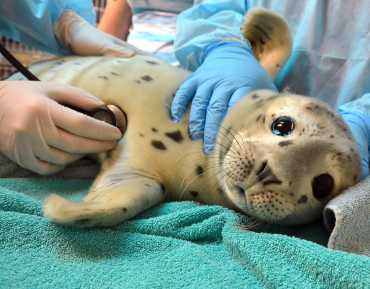
The Marine Mammal Center Announces Addition of Cetacean Field Research Program
- Behavior
- Species conservation
The Center is providing a home for the local nonprofit formerly known as Golden Gate Cetacean Research to increase solutions-focused study of whales, dolphins and porpoises in the San Francisco Bay Area.
The Marine Mammal Center is excited to announce the addition of a Cetacean Field Research program, led by a team of top researchers formerly from Golden Gate Cetacean Research. A core focus of the program will be to support the extension of protections in San Francisco Bay for cetaceans, or whales, dolphins and porpoises. These efforts will aim to better address the increasing negative human interactions in the urban environment, such as ship strikes, that are threatening whales and other species.
Dr. Tim Markowitz is joining the Center in the role of Cetacean Field Research Coordinator. Bill Keener, Izzy Szczepaniak and Marc Webber are joining the Center as Research Associates. For nearly a decade, this team and their partners have conducted scientific field research on marine mammals, with a particular emphasis on the cetaceans of the San Francisco Bay Area.
The three main research projects that will continue at the Center are:
- Humpback Whale Project
- Harbor Porpoise Project
- Bottlenose Dolphin Project
The Humpback Whale Project will allow researchers to continue to collect data on the risk of ship strikes. As whales enter the narrow Golden Gate to feed, they encounter ships transiting the area, creating the potential for collisions. The Center’s ultimate goal is to use this research in San Francisco Bay to bolster efforts worldwide to protect whales from the dangers of ship strikes and other human impacts. Researchers will also continue to compile the first-ever humpback whale photo-identification catalog for San Francisco Bay and investigate their behavior.
Harbor porpoises have returned to San Francisco Bay after an absence of approximately 65 years. The Harbor Porpoise Project will continue a multi-year assessment to document this population’s abundance and distribution, as well as to examine their social behavior and calving success.
Bottlenose dolphins are more recent inhabitants of the San Francisco Bay Area, expanding their range north from Monterey Bay and Southern California over the past 10 years. The Bottlenose Dolphin Project will continue a collaboration with researchers along the California coast to track individual dolphins and study their use of habitat in San Francisco Bay.
As part of the Center’s new Cetacean Field Research Program, the public will be asked to report sightings of whales, dolphins and porpoises in the San Francisco Bay Area through our community science portal. These observations will add to our overall knowledge of these species and support large-scale monitoring efforts.
The Marine Mammal Center is delighted to provide a home for this team, which will help increase the impact that is so much a part of the Center’s own mission and conservation goals.
You Can Make a Difference
As whales continue to make San Francisco Bay a permanent stop on their annual migration it is imperative that we support solutions-focused research, such as our Humpback Whale Project. This 3-year project will cost more than $500,000 and is essential to protecting these gentle giants from human impacts. Please help whales, dolphins, porpoises and other marine mammals by making a donation today.
Yes, I want to save a life!

Yes, I want to save a life!
You’ll be giving sick and injured animals the best possible care at the Center’s state-of-the-art hospital. With your gift today, you are giving a patient a second chance at life in the wild.
See Our Latest News
{"image":"\/Animals\/Wild\/Gray whale\/cropped-images\/two-gray-whales-golden-gate-bridge-shutterstock-0-0-1270-992-1770234810.jpg","alt":"two gray whales under the Golden Gate Bridge","title":"The Marine Mammal Center and San Francisco Harbor Safety Committee Pilot New Vessel Operator Training Program","link_url":"https:\/\/www.marinemammalcenter.org\/news\/the-marine-mammal-center-and-san-francisco-harbor-safety-committee-pilot-new-vessel-operator-training-program","label":"Press Release","date":"2026-02-06 01:00:00"}

The Marine Mammal Center and San Francisco Harbor Safety Committee Pilot New Vessel Operator Training Program
February 6, 2026
Read More{"image":"\/Animals\/Wild\/Bottlenose dolphin\/cropped-images\/dolphinphoto-by-adam-li-c-noaa-0-0-1270-992-1769539954.jpg","alt":"A bottlenose dolphin jumps out of the water.","title":"What\u2019s the Difference Between Dolphins and Porpoises? And Other Animal Trivia","link_url":"https:\/\/www.marinemammalcenter.org\/news\/whats-the-difference-between-dolphins-and-porpoises-and-other-animal-trivia","label":"News Update","date":"2026-01-26 23:00:00"}

What’s the Difference Between Dolphins and Porpoises? And Other Animal Trivia
January 26, 2026
Read More{"image":"\/Animals\/Patients\/Sea otters\/2025\/cropped-images\/so-mooring-release-2-laurie-miller-c-the-marine-mammal-center-USFWS-permit-MA101713-1-147-8-1270-992-1770307740.jpg","alt":"Sea otter - Mooring","title":"Rescue Stories: Southern Sea Otter Mooring Named the 2025 Patient of the Year","link_url":"https:\/\/www.marinemammalcenter.org\/news\/rescue-stories-vote-for-your-favorite-marine-mammal-patient-of-2025","label":"News Update","date":"2026-01-16 10:05:08"}

Rescue Stories: Southern Sea Otter Mooring Named the 2025 Patient of the Year
January 16, 2026
Read More{"image":"\/People\/Action\/Veterinary care\/cropped-images\/Harris_Green turtle_TMMC-0-0-1270-992-1767649941.jpg","alt":"Heather Harris","title":"Seattle Aquarium Awards Dr. Heather Harris With Prestigious Conservation Research Award","link_url":"https:\/\/www.marinemammalcenter.org\/news\/seattle-aquarium-awards-dr-heather-harris-with-prestigious-conservation-research-award","label":"In the News","date":"2026-01-05 04:48:00"}

Seattle Aquarium Awards Dr. Heather Harris With Prestigious Conservation Research Award
January 5, 2026
Read More